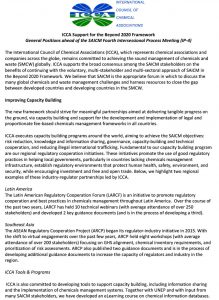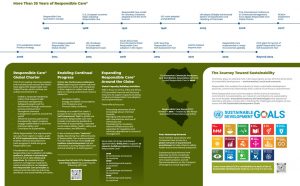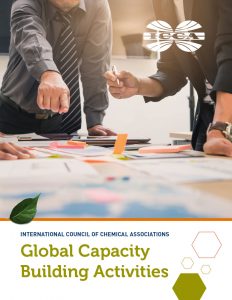SAICM Fourth Intersessional Meeting (IP4)
 ICCA is in Bucharest, Romania for the Fourth meeting of the intersessional process (IP4) to consider the Sound Management of Chemicals and Waste (SMCW) beyond 2020. At IP4, ICCA will reaffirm our commitment to implementing the Strategic Approach to International Chemicals Management (SAICM) globally. We will continue to advocate for the development of mechanisms to guide implementation of the sound management of chemicals and waste. We will also support the development of tangible indicators for measuring progress on sound chemicals management, such as measurable targets and objectives that are based on the Overall Orientation and Guidance (OOG).
ICCA is in Bucharest, Romania for the Fourth meeting of the intersessional process (IP4) to consider the Sound Management of Chemicals and Waste (SMCW) beyond 2020. At IP4, ICCA will reaffirm our commitment to implementing the Strategic Approach to International Chemicals Management (SAICM) globally. We will continue to advocate for the development of mechanisms to guide implementation of the sound management of chemicals and waste. We will also support the development of tangible indicators for measuring progress on sound chemicals management, such as measurable targets and objectives that are based on the Overall Orientation and Guidance (OOG).
Our other positions, contributions, and activities in support of a successful post-2020 outcome are summarized below.
Global Chemical Industry Supports SAICM
ICCA is strongly committed to SAICM, which we support through both direct funding and engagement in various SAICM processes. ICCA recently doubled its annual contributions to the SAICM Secretariat with the desire to advance tangible projects that are key in building capacity for chemicals management.
To be successful, SAICM should remain a voluntary global framework, driven by fit-for-purpose national and regional legal frameworks, with a risk- and science-based focus. The priority should be to establish and enforce fit-for-purpose and fee-based legally binding chemical management systems at the national level in all jurisdictions. We welcome more opportunities to partner on more specific projects aimed at closing the gap between developed and developing countries to soundly manage chemicals.
Spreading an Ethic of Responsible Care®
 Responsible Care® is the global chemical industry’s voluntary initiative to foster safe management of chemicals worldwide. CEOs from leading chemical suppliers and manufacturers around the world have signed the Responsible Care Global Charter, a commitment to achieve continuous improvement in the environmental, health, safety and security (EHS&S) performance of chemical processes, operations and products.
Responsible Care® is the global chemical industry’s voluntary initiative to foster safe management of chemicals worldwide. CEOs from leading chemical suppliers and manufacturers around the world have signed the Responsible Care Global Charter, a commitment to achieve continuous improvement in the environmental, health, safety and security (EHS&S) performance of chemical processes, operations and products.
Beginning in Canada in 1985, today, Responsible Care is practiced in nearly 70 global economies and is an essential part of the global chemical industry’s strategy to promote chemical safety and sustainability around the world.
Global Responsible Care Capacity Building
 With a focus on China, India and Africa, ICCA provides financial and technical resources to support capacity building to advance the Responsible Care ethic.
With a focus on China, India and Africa, ICCA provides financial and technical resources to support capacity building to advance the Responsible Care ethic.
Since 2019, ICCA has contributed approximately €860,000 to support 79 capacity building projects promoting Responsible Care implementation. Our efforts focus on fostering awareness of chemical hazards; managing risks associated with manufacture and use of chemicals; and developing the necessary national infrastructure and capacities for regulatory and voluntary approaches to chemical management.
Capacity Building Clearinghouse
As many have noted in the negotiations of the new Beyond 2020 framework, the status quo is not an option. Together, we must consider new ideas and opportunities to facilitate such partnerships, while avoiding duplication and reducing inefficiencies. This requires a sustainable financing mechanism by which financial contributions from a diverse set of stakeholders flows to clearly identified projects with concrete deliverables, including an adequate commitment mechanism. However, focusing solely on increasing the pot of money will not solve our persistent challenges of establishing and enforcing fit-for-purpose and fee-based legally binding chemical management systems.
In this vein, industry welcomes the creation of a Capacity Building Clearinghouse Mechanism to match the identified need by countries for concrete projects in support of SAICM objectives, with financial means and expertise provided by donors. We would welcome the SAICM secretariat’s inclusion of the Capacity Building Clearinghouse Mechanism in its Capacity Building Strategy. We strongly support partnering with like-minded stakeholders and defining win-win-win opportunities and concrete projects that serve the SAICM objectives. We call upon all SAICM stakeholders to support working intersessionally on arrangements for establishing such a mechanism at ICCM-5.
New GHS Project in Africa
Four African countries – Kenya, Ghana, Cote d’Ivoire, and Nigeria – are undertaking a new pilot project to support national implementation of the Globally Harmonized System of Classification and Labelling of Chemicals (GHS). The GHS is one of the fundamental tools to achieve sound management of chemicals. Key elements include legislation to implement GHS, as well as ensuring that the necessary training, guidance, and tools are in place to implement and enforce the legislation.
The four-year pilot project is a collaboration between ICCA, the Strategic Approach to International Chemicals Management (SAICM), the European Union, UN Environment Programme (UNEP), the European Chemicals Agency (ECHA), and the UN Institute for Training and Research (UNITAR).
Three African countries – Mauritius, South Africa, and Zambia – have already implemented the GHS. Expanding implementation across the region is a key undertaking to promote the safe handling of chemicals.
Information Sharing and E-Learning Course for EHS Chemical Safety Data
ICCA and UNEP have partnered to develop a comprehensive e-learning course to improve access to environment, health, and safety (EHS) information for industrial chemicals.
The e-learning course aims to raise awareness, educate, and equip stakeholders with key basic information on locating and utilizing chemical EHS information. Target audiences include relevant policymakers and officials in national ministries charged with chemical-related functions; private sector producers; importers, distributors, and downstream users with a focus on reaching small-and-medium enterprises; and civil society organizations with a commitment to the sound management of chemicals.
The e-learning course on Industrial Chemicals Databases and Information Sharing has been deployed on InforMEA platform under the category, Chemicals and Waste.
ASEAN & LATAM Regulatory Cooperation
ICCA plays a leading role in ongoing global regulatory cooperation activities in Southeast Asia and Latin America.
The Latin America Regulatory Cooperation Forum (LARCF) promotes the design and implementation of consistent, economically efficient, and science-based regulatory systems for chemicals management in Latin American countries. An initiative of LATAM chemical associations, LARCF brings together more than 100 industry members of the region. LARCF held more than 10 technical webinars during the pandemic, each with an average of 250 participants.
In addition, LARCF established the Virtual Working Group for the Sound Management of Chemicals in Latin America (VWG-SMC-LA), comprised of representatives of the governments and the industrial sector of the region. This has already resulted in the development of two key guidelines (a chemicals management roadmap and a guidance document on building chemical inventories), with a third guidance document on Prioritization underway.
Through the ASEAN Regulatory Cooperation Project (ARCP), ICCA and our partners have held numerous workshops focusing on GHS alignment, chemical inventory requirements, and prioritization of risk assessments. More than 200 representatives from industry and government from all ten ASEAN members have participated in ICCA’s virtual regulatory cooperation activities.
Moving forward, ICCA’s aim is to continue to strengthen chemicals management capacities in both regions and encourage an ongoing dialogue between government, industry and associations.
ICCA Regulatory Toolbox
ICCA has developed a Regulatory Toolbox that is designed to help countries implement best practices in risk assessment and product stewardship into their own national chemical safety legislation. The Toolbox represents the collective industry experience with various chemical management systems, including in the United States, Canada, EU, and Japan.
The Toolbox specifically focuses on how industry and governments can continue to work together towards the 5 SAICM Objectives: Risk Reduction, Knowledge and Information Sharing, Governance, Capacity-building and technical cooperation, and reducing illegal international trafficking.
Depending on the needs of a country, resources (human and financial), and the level of knowledge, not all elements within the Toolbox would be required. These various elements can assist countries in developing and enforcing legislation for the sound management of chemicals, including reporting, toxicological testing, and use of chemicals to ensure protection of human health and environment while considering their impact on countries’ economies. A stepwise implementation is recommended to take into consideration the varying degrees of availability of resources and identified risks in order to regulate chemicals in the most effective way possible.
